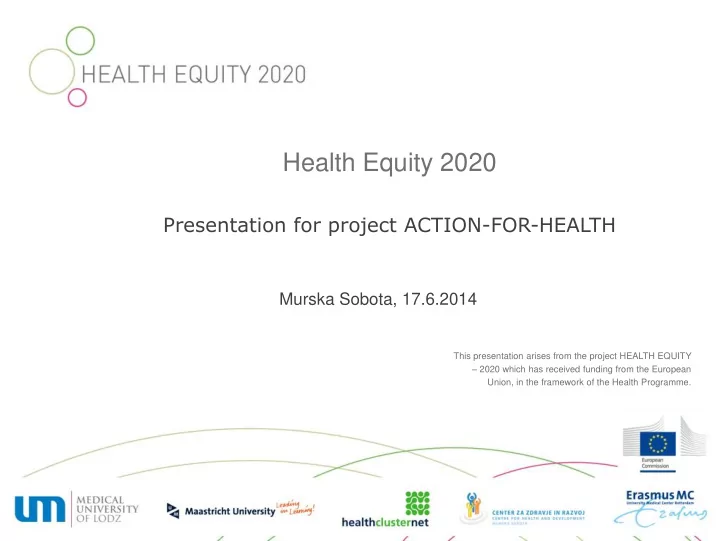

Health Equity 2020 Presentation for project ACTION-FOR-HEALTH Murska Sobota, 17.6.2014 This presentation arises from the project HEALTH EQUITY – 2020 which has received funding from the European Union, in the framework of the Health Programme.
AIMS AND OBJECTIVES The general objective of the HE2020 project is to assist Member States/ regions to develop evidence-based action plans on reducing health inequalities, which also informs the use of structural funds (SF) in the next programming period. The project seeks to • explore potential action areas • make the case (including economic evidence) for investments to reduce health inequalities through actions within & beyond the health sector.
AIMS AND OBJECTIVES In particular, the project seeks to: • develop action plans in a number of EU regions and provide some examples and tools which can be used by other regions • consider investment needs to be broader than health systems: o Public health policy development and implementation Social policy – including measures to address exclusion o o Employment and health policies o Housing o Administrative capacity
MEANS The project strongly builds on existing knowledge & lessons from EUREGIO III and other relevant health programme projects to inform entry points to action including: • health & Structural Funds, • analysis of determinants of health inequalities using available data, • views of what works in reducing health inequalities, and • tools for health equity related impact assessment
8 WORKPACKAGES: 3 + 5 WP1 WP3 WP2 Management & Evaluation Dissemination Coordination HCN HCN WP5 Pilot action in a large EU 10 WP4 region Translational MUL WP8 WP7 Capacity Building evidence and policy Action learning UM programme Erasmus MC UM WP6 Pilot action in a small EU10 micro-region CHD
PARTNERS • University of Maastricht, Department of International Health (Lead) • Health ClusterNET • Erasmus MC, Department of Public Health • Medical University of Lodz • Centre for Health and Development Murska Sobota
PARTICIPATING REGIONS, PILOT REGIONS • 2 pilot regions: • Pomurje (a micro-region in Slovenia) • Lodzskie (a large region in Poland) • Other participating regions: • Vysočina region, Czech Republic • Northern Great Plain region, Hungary • Trenčín region, Slovakia • Klaipėda District Municipality, Lithuania • NUTS 2 level regions (all country) Latvia • Stara Zagora, Bulgaria • Covasna, Romania • Tallin University, Estonia
regions Vysočina Tallinn 159.2 km2, 428,778 inhab. 6,795 km2 , 500,000 inhab. Interest: social factors/ Interest: health behaviour financial problems:, out patience facilities, accessibility/transportation Latvia 64,589 km2, 2mil. inhab. Interest: the inaccessibility to Self-governing region of health services in the Trenčín regions; migration; lifestyle; social exclusion 4,501 km 2, , 600,000 inhab. Klaipėda District Interest: migration, age groups, 1,336 km 2 , 52,000 inhab. health prevention, Interest: socio-economic- patient safety ethnic groups, health promotion groups with low income/lower education Northern Great Covasna Plain 17,749 km 2 , 1.5 mil inhab. 3,710km 2 , 206,261 inhab. Interest: rural areas Interest: rural areas, the Roma population, psychological illnesses Stara Zagora 5,151 km 2 ; 331,000 inhab. Interest: the Roma population
METHODS BUILDING THE TOOLKIT WP4: Translational evidence and policy: workshop feedback, update and plan for the toolkit 1. case by case needs assessment, 2. portfolio of actions known to be effective in addressing entry-points, 3. case-by-case analysis of the potential impact of these actions on population health and economic performance: TESTING THE TOOLKIT Pilot action in WP5: a large pilot region (Lodzskie, Poland) and WP6 a small pilot region (Pomurje, Slovenia): Regions involvement to developing a toolkit for evidence-based regional action planning Challenges to collecting evidence: what will be done? Dealing with health inequalities by using national/regional development plans as gateways
METHODS SHARING THE TOOLKIT WP7: Action learning workshops; WP8: Capacity building support • Capacity building audit in pilot micro region in M6: update (WP8) • Prepare a plan for the AL Programme (to be adopted in M8) (WP7) • Peer review of policy matrix for expert pool in M9 (WP8) • Main considerations to maximise effectiveness of work with regions
• capacity audit • addressing health REFLECTING • toolkit inequalities The action learning approach DOING CONNECTING action plans • workshops • in DECIDING preparation events
Workshops and supportive events Workshop 1 Workshop 3 Needs Assessment Impact assessment 17/18 th October 2013 July 2014 supporting regions in: impact assessment & action planning supporting regions in: agenda building / priority setting/capacity audit Workshop 4 supporting regions in defining entry points Action Planning develpment of: the capacity audit Workshop2 preparing impact tool & tool box ; Entry Points October 2014 assessment testing in pilot regions February 2014
EXPECTED OUTCOMES
WHO IS HE2020 FOR? • key stakeholders at regional & national levels governments, municipalities; SF operational programme managing authorities; Ministry of Health and Social Affairs; development agencies; actors of health systems • European stakeholders (EC line directorates, EIB, CP) • citizens to ensure that participating regions involve population groups & civil society organizations in regional/local action groups tasked with developing action plans
WHY IS HE2020 DIFFERENT FROM OTHER PROJECTS? STRATEGIC RELEVANCE • Relevance to regional and national strategies and policies • Relevance to other key EU strategies and policies • Relevance for exploring the role of social innovation • Relevance to contributing to EC communication • Relevance to informing structural funds policies
Thank you for your attention! Peter Beznec, Centre for Health and Development Murska Sobota Peter.beznec@czr.si
Recommend
More recommend